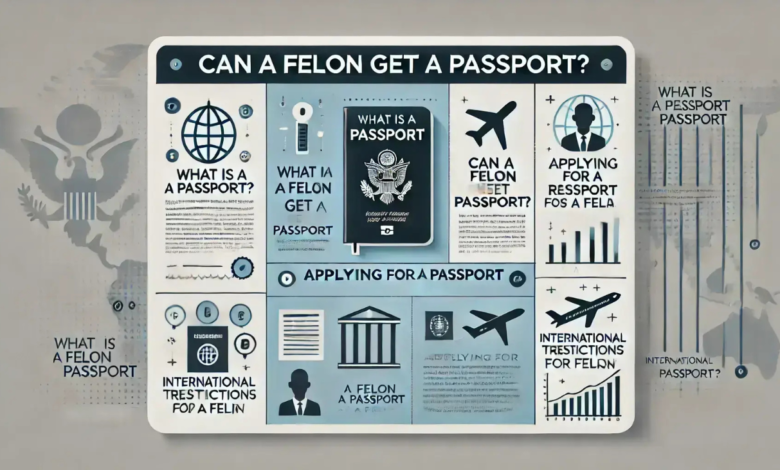Can a Felon Get a Passport?

For individuals with a felony conviction, questions about travel rights often arise, particularly the ability to obtain a passport. This document, a gateway to international travel, is essential for accessing opportunities abroad, whether for leisure, work, or family obligations. But the process isn’t always straightforward for felons. In this article, we’ll explore the nuances and legal considerations surrounding the question: can a felon get a passport?
What is a Passport?
A passport is an official government document that verifies a person’s identity and citizenship, enabling international travel. While a passport allows you to leave and return to your home country, it doesn’t guarantee entry into other nations. Every country has its own criteria for granting entry, and for felons, these rules can vary widely.
Can a Felon Get a Passport?
The answer largely depends on the specific circumstances of the felony conviction. U.S. law does not automatically disqualify felons from obtaining a passport, but there are exceptions. Let’s break down the key factors:
Type of Felony Conviction
Certain felony convictions, particularly those involving international drug trafficking, can result in automatic denial of a passport. Under U.S. law, if the felony was related to the illegal transport of controlled substances across international borders, you may be permanently ineligible.
Probation or Parole Status
If you’re currently on probation, parole, or facing restrictions on your travel as part of your sentence, your application for a passport will likely be denied. Courts and law enforcement agencies impose these limitations to ensure compliance with sentencing conditions.
Outstanding Warrants or Court Orders
Individuals with active warrants, unpaid court fines, or unresolved legal issues related to their felony conviction may also be barred from obtaining a passport. These unresolved matters signal non-compliance with legal obligations, which can trigger a denial.
Financial Obligations
Debts to the government, such as owing more than $2,500 in child support, can prevent the issuance of a passport, regardless of a felony conviction. It’s crucial to address any financial liabilities before applying.
Applying for a Passport as a Felon
If you meet the eligibility criteria and your felony does not fall under the exceptions listed above, you can apply for a passport just like any other U.S. citizen. Here’s how:
Gather Documentation
Ensure you have proof of U.S. citizenship (such as a birth certificate or naturalization certificate), a government-issued ID, and recent passport photos.
Complete the Application
Fill out Form DS-11 for a new passport or Form DS-82 for a renewal. Be honest about your legal history if required.
Submit the Application
Visit a local passport acceptance facility, such as a post office, courthouse, or passport agency, to submit your application and fees.
International Travel Restrictions for Felons
While obtaining a passport may be possible, international travel is another matter. Many countries have strict entry policies for individuals with a criminal record. For example:
Canada
Canada has stringent rules for felons, often barring entry to those with serious convictions. However, you can apply for criminal rehabilitation or a temporary resident permit to gain access.
Australia
Felons sentenced to 12 months or more of imprisonment may face entry restrictions unless a special visa is obtained.
United Kingdom
Entry decisions are made on a case-by-case basis, but serious crimes could result in denial.
It’s essential to research the entry requirements of your intended destination well in advance of your travel plans.
Addressing Common Myths
There are many misconceptions about felons and passports. Let’s clear up some of the most common:
Felons Are Always Denied Passports
Truth: Most felons can obtain a passport unless their conviction falls under specific exceptions, such as drug trafficking or active legal issues.
A Passport Ensures Freedom to Travel Anywhere
Truth: A passport is a travel document, not a guarantee of entry. Foreign governments have the final say on whether to admit someone with a criminal record.
Expunged Records Don’t Matter
Truth: If your record has been expunged or sealed, it may not impact your passport application. However, some countries may still consider past convictions when determining entry.
Steps to Improve Your Chances
If you’re a felon hoping to obtain a passport, consider these steps:
Resolve Outstanding Issues
Clear up any legal, financial, or probation-related matters before applying.
Consult Legal Counsel
An attorney can help you understand your rights and guide you through the application process.
Research Destination Policies
Familiarize yourself with the entry requirements of countries you plan to visit to avoid unpleasant surprises.
FAQs About Felons and Passports
Can a felon get a passport if they have served their time?
Yes, in most cases, felons who have completed their sentence can apply for a passport, unless they fall under specific restrictions.
Can a felon with an expunged record get a passport?
Yes, if your record has been expunged, it may not affect your ability to obtain a passport. However, entry into other countries may still be restricted.
Does owing child support affect getting a passport?
Yes, owing more than $2,500 in child support can prevent the issuance of a passport, even if you do not have a felony conviction.
Can felons travel internationally?
It depends on the destination. Some countries may deny entry to individuals with a felony record, while others may require special permits.
How long does it take to get a passport as a felon?
The processing time is generally the same as for any other applicant, but unresolved legal or financial issues can cause delays.
Conclusion
So, can a felon get a passport? In most cases, yes. While there are exceptions based on the type of felony and current legal status, many felons retain their right to obtain this vital travel document. However, having a passport is only part of the equation; navigating international travel as a felon requires careful planning and awareness of foreign entry policies. By addressing any outstanding legal or financial issues and researching thoroughly, you can pave the way for successful travel experiences, even with a felony on your record.
By understanding the nuances of this topic, individuals with a felony conviction can confidently answer the question: can a felon get a passport?


